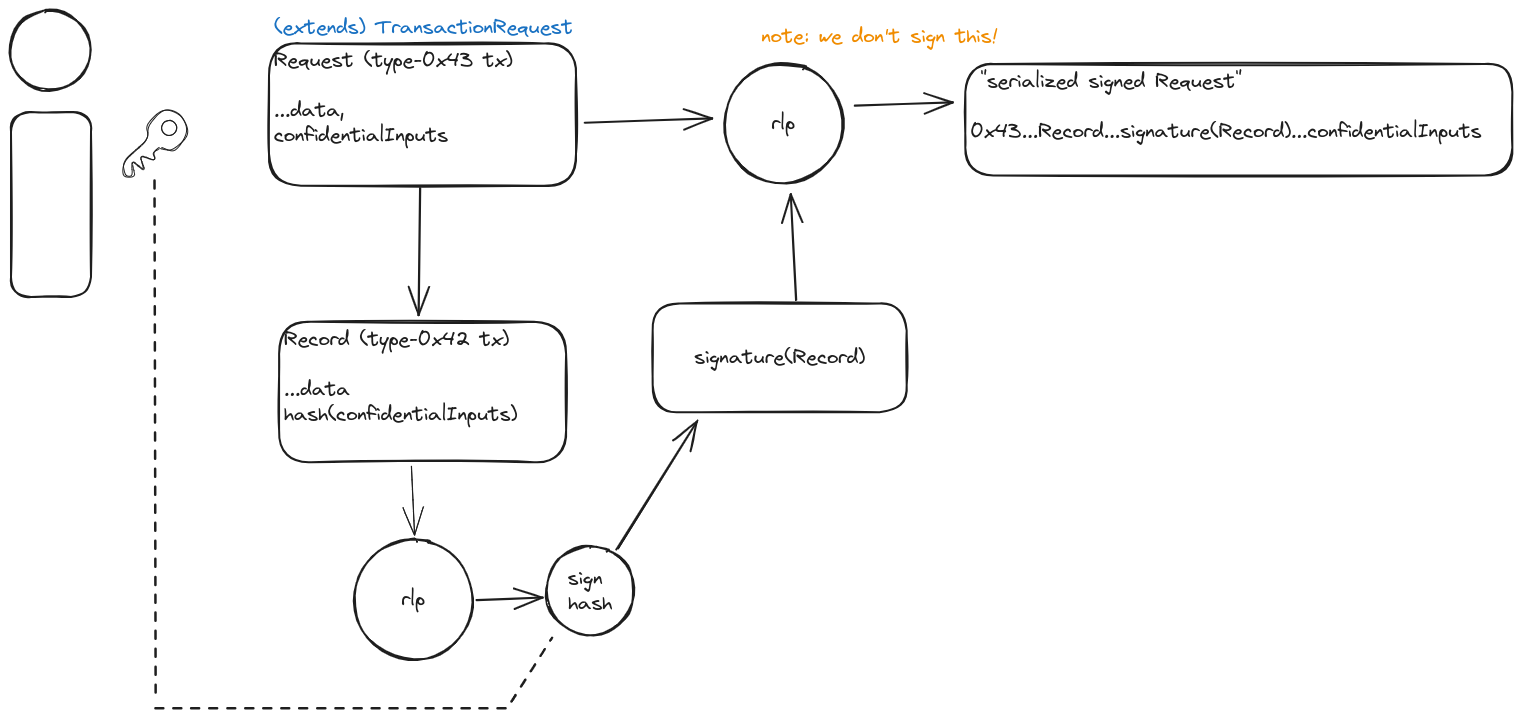Suave Chain
This document outlines the specifications for the SUAVE Rigil chain.
In the context of the SUAVE protocol, the primary purpose of the SUAVE chain is to reach (and maintain) consensus about smart contract code for use cases such as order flow auctions, solvers, block builders, etc. Additionally, the SUAVE chain can also be used to store and broadcast data for better censorship guarantees.
In the initial phases of development, the SUAVE chain runs a proof-of-authority consensus protocol called Clique, over a network of permissioned nodes. We do so to experiment and iterate quickly during protocol development. This will change in later testnets.
Configuration
Network Parameters
- Network ID:
16813125 - Chain ID:
16813125
Genesis Settings
| Name | Value | Unit |
|---|---|---|
PERIOD | 4 | block |
EPOCH | 30000 | block |
BLOCK_TIME | 3 | second |
GAS_LIMIT | 30000000 | gas |
NUM_VALIDATORS | 5 | Nodes |
Consensus Mechanism: Proof-of-Authority (Clique)
Clique, an Ethereum-based Proof-of-Authority consensus protocol defined here, restricts block minting to a predefined list of trusted signers. Because of this, every block header a client sees can be checked against the list of trusted signers.
Geth Version
Suave-geth is based on geth v1.12.0 (e501b3).
Suave Transaction
The SUAVE protocol adds a new transaction type to the base Ethereum protocol called a SuaveTransaction. The purpose of this new transaction type is to process fees for offchain computation and to support the new data primitives associated with confidential compute.
Blocks on the SUAVE chain consist of lists of SUAVE transactions. This new transaction type facilitates and captures key information involved in Confidential Compute Requests and their subsequent results. Any ConfidentialComputeRequest, signed by the user, specifies an KettleAddress. SUAVE transactions are valid if and only if they are signed by the KettleAddress specified by the user in the original ConfidentialComputeRequest, which is included as the ConfidentialComputeRecord.
type SuaveTransaction struct {
ConfidentialComputeRequest ConfidentialComputeRecord
ConfidentialComputeResult []byte
// Kettle's signature
ChainID *big.Int
V *big.Int
R *big.Int
S *big.Int
}
Suave Transaction Types
SuaveTransaction is the primary transaction type which is returned when requesting transactions from endpoints like eth_getTransactionByHash or eth_getBlockByNumber, but SUAVE introduces two other important message types: ConfidentialComputeRequest and ConfidentialComputeRecord. All new types are detailed in the following table:
| Name | EIP-2718 Tx Type | Description |
|---|---|---|
| SuaveTransaction | 0x50 | SUAVE transaction; product of executed ConfidentialComputeRequest |
| ConfidentialComputeRequest | 0x43 | Sent by users to interact with SUAVE smart contracts using confidential inputs |
| ConfidentialComputeRecord | 0x42 | Artifact of ConfidentialComputeRequest; represents record that is stored on SUAVE chain |
TransactionRequest Serialization & Signing
Messages sent by users of SUAVE can take on two forms:
- Standard (legacy) Ethereum transaction
ConfidentialComputeRequest
Standard transactions are used to transfer SUAVE-ETH and deploy smart contracts to SUAVE chain. ConfidentialComputeRequests are a new EIP-2718 message type, used to interact with SUAVE smart contracts. Note that 'ConfidentialComputeRequests' are not classified as 'transactions' since 'transaction' implies changes to the state of a database/blockchain. Kettles do not provide persistent storage guarantees and are instead intended to convert inputs to outputs (like transactions targeted at blockchains).
All transactions are encoded with the EIP-2718 RLP-encoding scheme (with EIP-2930 allowed), but ConfidentialComputeRequest takes on a special signature scheme that deviates slightly from the traditional method.

ConfidentialComputeRequests adopt this unique signing scheme to keep confidentialInputs off-chain. The ConfidentialComputeRecord, which is signed by the sender, contains only the hash of confidentialInputs. This record is stored on the SUAVE chain, making verification of confidentialInputs possible without exposing the actual data on-chain.
In javascript, a ConfidentialComputeRequest has the following structure:
const cRequest = {
confidentialInputs: '0x000000000000000000000000000000000000000000000000000000000000002000000000000000000000000000000000000000000000000000000000000000fd7b22626c6f636b4e756d626572223a22307830222c22747873223a5b2230786638363538303064383235323038393461646263653931303332643333396338336463653834316336346566643261393232383165653664383230336538383038343032303131386164613038376337386234353663653762343234386237313565353164326465656236343031363032343832333735663130663037396663666637373934383830653731613035373366336364343133396437323037643165316235623263323365353438623061316361336533373034343739656334653939316362356130623661323930225d2c2270657263656e74223a31307d000000',
kettleAddress: '0xb5feafbdd752ad52afb7e1bd2e40432a485bbb7f',
to: '0x8f21Fdd6B4f4CacD33151777A46c122797c8BF17',
gasPrice: 10000000000n,
gas: 420000n,
type: '0x43',
chainId: 16813125,
data: '0x236eb5a70000000000000000000000000000000000000000000000000000000000000002000000000000000000000000000000000000000000000000000000000000006000000000000000000000000000000000000000000000000000000000000000a000000000000000000000000000000000000000000000000000000000000000010000000000000000000000008f21fdd6b4f4cacd33151777a46c122797c8bf170000000000000000000000000000000000000000000000000000000000000000',
}
Note: new fields: confidentialInputs and kettleAddress.
To serialize, sign, and send this request, the client must first RLP-encode the request as a ConfidentialComputeRecord and sign its hash.
Note: the following is pseudo-code. rlp, keccak256, and wallet.sign implementations may differ.
const {
nonce,
gasPrice,
gas,
to,
value,
data,
kettleAddress,
confidentialInputs,
chainId,
} = cRequest
const rlpRecord = rlp('0x42', [
kettleAddress,
keccak256(confidentialInputs),
nonce,
gasPrice,
gas,
to,
value,
data,
])
const {v, r, s} = wallet.sign(keccak256(rlpRecord))
cRecord = {...cRecord, v, r, s}
Then, the final request is re-encoded with RLP as follows:
// assume (v, r, s) have been added to cRecord
const tx = rlp('0x43', [
cRecord.nonce,
cRecord.gasPrice,
cRecord.gas,
cRecord.to,
cRecord.value,
cRecord.data,
cRecord.kettleAddress,
keccak256(cRequest.confidentialInputs),
cRecord.chainId,
cRecord.v === 27n ? '0x' : '0x1', // yParity
cRecord.r,
cRecord.s,
],
confidentialInputs
)
This is then sent to SUAVE via eth_sendRawTransaction:
wallet.request('eth_sendRawTransaction', [tx])
Node Requirements and Setup
- Hardware:
- Minimum 8GB RAM, four cores, 50GB SSD (How big do we expect the chain to grow?)
- These requirements will eventually incorporate Trusted Execution Environments (TEEs).
- Software: suave-geth
- Setup Steps:
- Clone suave-geth
- Start the devnet:
make devnet-up - Create transactions:
go run suave/devenv/cmd/main.go
Gas and Transaction Fees
The SUAVE chain employs the same gas pricing mechanism as Ethereum pre-Cancun hardfork (no blob transactions) where gas prices adjust based on network demand. Nodes currently track Confidential Compute Request gas usage but only charge a small flat fee for it, and there is no cap for offchain compute.
Currently, SUAVE transactions can only be expressed as Legacy transaction types, but they will get converted into EIP-1559 base fee model under the hood.
Security Considerations
- Security Risk: The protocol is unaudited. The protocol currently does not make any guarantees about the confidentiality of data in the network outside of a best effort.
- DoS Risk: Nodes have not yet been reviewed, and there may be DoS vectors at this early stage.
- Secure Key Management: Storing private keys on Suave is experimental and should be considered insecure.
If you find a security vulnerability in SUAVE, please email us at security@flashbots.net.